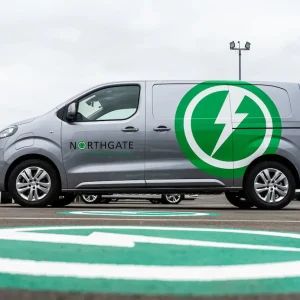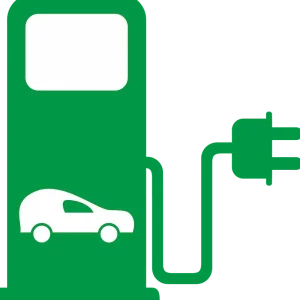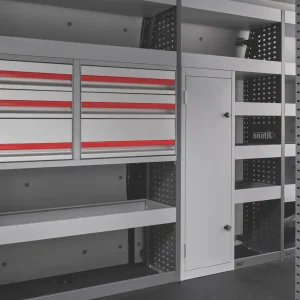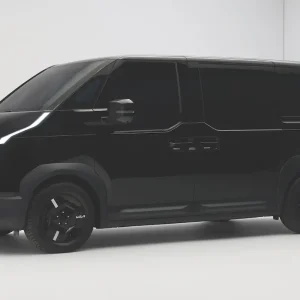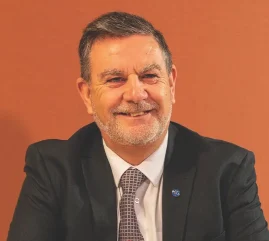
In an industry where progress often inches forward, Eric Wright Group is breaking ground – not just in construction but also in the electrification of its fleet.
The company’s dedication to environmental stewardship and sustainability not only emphasises its commitment to advocating for positive environmental outcomes but also establishes a groundbreaking benchmark for the construction sector.
At the helm of the fleet is Steve Openshaw, a seasoned professional with a career tracing back to the 1980s. He initiated his journey as a mechanic handling construction equipment, steadily advancing through various management roles before joining the fleet at Eric Wright 17 years ago. Essentially, anything with an engine and wheels falls within his realm of expertise.
Electrifying the van fleet
Electrifying van fleets presents unique challenges, says Openshaw. “Unlike companies such as Royal Mail and last-mile delivery services, which benefit from depot-based operations, many companies, like ours, rely on take-home vans that don’t return to a central depot.”
To tackle this, the group is collaborating with professional bodies like the Association of Fleet Professionals (AFP) and British Vehicle Rental and Leasing Association (BVRLA) to explore solutions for on-street charging where these vans are parked. The fleet is also working with BP Pulse to install dedicated charge points at managed locations, ensuring vans can charge when needed, without requiring drivers to charge at home, which could inconvenience their use of personal vehicles.
The company has conducted an analysis of dwell times and journeys, and has
found that a portion of the van fleet is now ready to transition to electric vehicles, provided the necessary infrastructure is in place. However, Openshaw explains the process is lengthy, involving numerous stakeholders and navigating various hurdles and committees.
“The challenge lies in convincing stakeholders that this transition is the right move. We aim to facilitate this shift and support others on their electrification journey,” he notes.
When it comes to infrastructure, Openshaw believes it is crucial to consider who the charging solutions are targeting and how they will be used. “We debated installing a 50kW or larger charger in partnership with BP Pulse. However, the costs are significant, and the charger would need to be public, especially given our proximity to motorways, which aligns with their strategic focus.”
Hydrogen for heavier vehicles
Openshaw expressed his view that hydrogen holds greater promise for heavy vehicles – a category absent from Eric Wright’s vehicle line-up. “For larger vans, particularly those around the 3.5-tonne mark, a shift towards hydrogen power seems inevitable,” he states.
While battery power works well for vehicles up to 2.0-tonnes, heavier vehicles are more likely to benefit from hydrogen fuel in the long term, offering a more viable solution for their energy needs. “This transition will not only necessitate the development of infrastructure and retail support but also generate demand that will drive hydrogen production,” Openshaw explains. “While the specifics are uncertain, I believe hydrogen will emerge as the end game in this scenario. It’s a matter of waiting and observing how the hydrogen landscape unfolds.”
Supporting drivers through change
The fleet wanted to ensure its electric vehicle offering wasn’t limited to those with car allowances. Young professionals and older individuals interested in going electric but unable to charge at home are now included. “We’ve opened our programme to everyone, with a capped rate aligned with an investor account rate.”
While not everyone will transition to EVs, the vast majority will. “My primary focus is on the light commercial fleet –getting it operational,” says Openshaw. “Full electrification won’t happen overnight, but it’s crucial to educate and involve everyone, from managers to drivers, in the transition process.”
For van drivers, there’s little direct benefit unless they’re eco-focused, unlike car drivers who enjoy significant tax incentives. Van drivers might question why they should spend an hour charging when a quick fuel stop would suffice. Our goal is to make it convenient – come home, plug in, and have a fully charged vehicle by morning.
The car fleet: a proven path to electrification
Openshaw is an enthusiastic early adopter of electric vehicles on the car and van fleet, having previously driven multiple EVs as his personal cars. Before his current Polestar 2, he was driving a BMW i3 range-extender, in which he covered 48,000 miles using only 30 litres of fuel. Openshaw humorously recalls being dubbed an “electronaut” by BMW.
His firsthand experience and passion for EVs served as a persuasive example for Eric Wright’s fleet of drivers, showcasing that a range of approximately 120 miles was manageable. This is notably lower than the majority of EVs available today, prompting the fleet to become early adopters too.
“We’re well on our way down the electrification route with our Eric Wright car fleet,” Openshaw says with a smile.
The fleet comprises 500 vehicles, 150 of which are vans, while the remaining 290 consist of a blend of company cars and cash allowance vehicles. Since those early days, the EV range and selection have increased significantly, allowing the fleet to continue adopting alternative fuels. Now, of the 500 vehicles, only 17 diesels and 4 petrols remain, the rest of which are mild hybrids, plug-in hybrids or pure electrics. In 2022, the group made headlines by delivering its hundredth electric fleet vehicle.
“We can offer an electric car in every grade we have now,” notes Openshaw. “Initially, they were only offered to drivers of senior grade or premium vehicles, but now we are able to provide a decent electric car in the junior grade too, it’s great,” he adds.
Training and safety enhancements
The AFP has developed an excellent training arm which the fleet follows, raising standards and offering professional qualifications not only for commercial vehicles but also for car fleets. This initiative helps people understand the complexities behind fleet management, driving the industry forward, notes Openshaw.
Eric Wright Group has also discovered that the adoption of EVs has seen the company significantly reduce the rates of their drivers getting into incidents. The main reason behind this change, says Openshaw, is regenerative braking, which assists the traditional brakes by slowing the car down, conserving energy.
He explains that drivers usually take to EVs quickly: “I’ve taken drivers out on the road and shown them how to drive them and when we switch they get the hang of it virtually straight away, they’re that simple to drive.”
The company has implemented dashcams across its van fleet to counteract false liability claims. Openshaw explains. “There were quite a few incidents where if we had a dashcam, it wouldn’t have been deemed our fault, despite appearing that way because we’re driving white vans, so to speak.” Using video evidence, the company has been able to defend many of its drivers who Openshaw says he had no reason to disbelieve.
Ultimately, the Eric Wright Group is paving the way for a sustainable fleet future, with Openshaw steering the charge. By embracing electrification, prioritising safety, and continuously adapting to industry challenges, the company is not just building infrastructure but also setting new standards for fleet management. With every mile, they’re driving toward a greener, smarter future.

